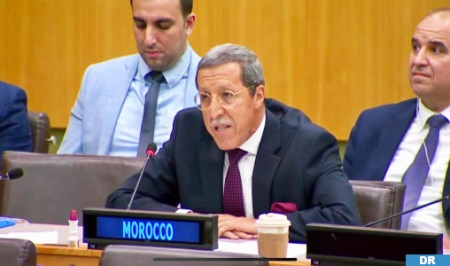
Algeria, the main party to the regional dispute over the Moroccan Sahara, must face the reality of the fiasco of its separatist project in the Sahara.
The remarks were made by Permanent Representative of Morocco to the United Nations, Omar Hilale, Tuesday in New York, before the ordinary session of the UN Committee of 24 (C24) held from June 10 to 21.
“Today, Algeria is faced with a choice: to follow a peaceful approach respectful of the principle of neighborliness and the peaceful settlement of disputes, or to get bogged down in the costly fiasco of its polisarian agenda, with billions of dollars and at the expense of the well-being of the Algerian people, who are lining up to obtain the most basic foodstuffs,” underlined Hilale, who called on neighboring Algeria to learn lessons from the bitter failure of its separatist project in the Moroccan Sahara.
“Instead of rehashing its speeches on its supposed defense of self-determination and proclaiming a pseudo neutrality in which it is the only one to still believe, Algeria would do better to take note of the three immutable evidences: The Sahara has always been Moroccan and will forever remain Moroccan; the Moroccan Autonomy Initiative is the one and only solution to this dispute, within the framework of the sovereignty and territorial integrity of the Kingdom; Morocco will carry on with determination the development strategy of its southern provinces, which are becoming a regional and continental hub”, he stated.
Recalling the creation of the C24 in 1961, by the UN General Assembly to implement resolution 1514 which enshrines the principle of self-determination, and which was adopted by this Assembly on December 14, 1960, the ambassador noted that over the years, there has been an unfortunate deviation in the implementation of the resolution 1514 coupled with an unfortunate exploitation of the C24 mandate.
“Indeed, in their great wisdom, the authors of resolution 1514 insisted on detailing the process of its implementation, supplementing it the following day with another resolution, 1541,” he said. This resolution (1541) which no one pretends to ignore, clearly establishes the 3 options for applying the principle of self-determination, in this case independence, free association or integration. Moreover, Resolution 2625 of 1970 added the option of any other freely chosen political status, he said.
“However, blinded by out-dated ideologies, and emphasizing the sole option of independence to the detriment of the two other alternatives, certain States have multiplied insidious maneuvers with a view to making the C24 a Committee of Balkanization”, regretted the ambassador, pointing out that “self-determination is not synonymous with a path towards independence. Moreover, self-determination cannot be achieved at the expense of the territorial integrity of States”.
Indeed, Resolution 1514 clearly states, in its OP 6, that “any attempt aimed at partially or totally destroying the national unity and territorial integrity of a country is incompatible with the purposes and principles of the UN Charter”, Hilale pursued.
“Moreover, these same States excel in the exegesis of 1514 and 1541 by linking self-determination to the referendum process. However, these two resolutions make no reference to the referendum, which is a simple mechanism of expression. They do not condition, either, the implementation of their relevant provisions by any referendum consultation”, the diplomat stated.
He stressed that it is “regrettable to note the deviation from the initial mandate of the C24 and to see the disappearance from our discussions, or even from the reports of this Committee, any reference to the other constituent elements of self-determination. It is equally regrettable to witness a rewriting of the C24 mandate by giving it an ideological connotation”.
Morocco’s ambassador to the UN further noted that it was on the basis of the initial mandate of the C24 that Morocco introduced to this Committee in 1963 the question of its Saharan provinces then under Spanish domination.
In parallel with its efforts within the C24, Morocco requested the advisory opinion of the ICJ in 1975, he recalled, noting that the Court did justice to the Kingdom by establishing the existence of legal links of allegiance between the Sultans of Morocco and the tribes of the Moroccan Sahara, thus confirming the irrefutable sovereignty of Morocco over its Sahara.
Omar Hilale noted that on the basis of this recognition, the Kingdom of Morocco concluded the Madrid Agreement with Spain in 1975, thus consecrating the return of the Sahara to its motherland, Morocco, after 91 years of Spanish occupation.
“This agreement was ratified by the United Nations General Assembly in its resolution 3458B of December 10, 1975, thus placing the process of recovering the territorial integrity of Morocco in line with the principles of the UN Charter, international law, and the spirit and letter of Resolution 1514,” he recalled.
The ambassador regretted that this issue unfortunately transformed into a bilateral regional dispute, since Algeria was guilty of violating article 6 of the aforementioned resolution 1514, by attempting to thwart the legitimate rights of Morocco over its Sahara and to undermine its sovereignty and territorial integrity, by creating, sheltering on its territory, arming and financing the armed separatist polisario group.
